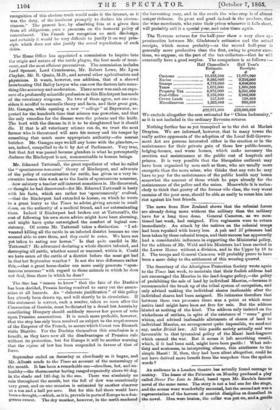The Secretary of the Aborigines Protection Society wrote again to
the Times last week, to maintain that their foolish address had not encouraged the Maories in the land-league policy,—the policy of prohibiting the sale of land by individual Maories,—because it recommended the break up of the tribal system of occupation, and only advised making the individual shares inalienable after the individual shares had been assigned. He intimates therefore that between these two processes there was a point at which some native land might have been set free for sale. But the address hinted at nothing of the kind. The address only insisted on the wickedness of settlers, in spite of the existence of " some " good whites, and advised inalienable allotments of shares of land to individual Maories, an arrangement quite impossible, we need not say, under British law. All this pacific society actually said was favourable to that tyrannical policy of the Maori land-leaguers which caused the war. But it seems it left something unsaid, which, if it had been said, might have been pacific ! What sub- tlety and acuteness, in interpreting silence, this attributes to the simple Maori 1 If, then, they had been silent altogether, could he not have derived more benefit from the unspoken than the spoken words ?






























 Previous page
Previous page